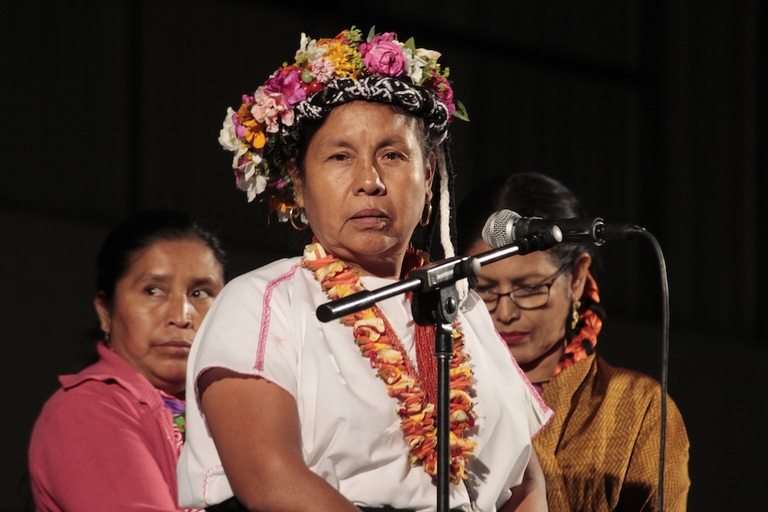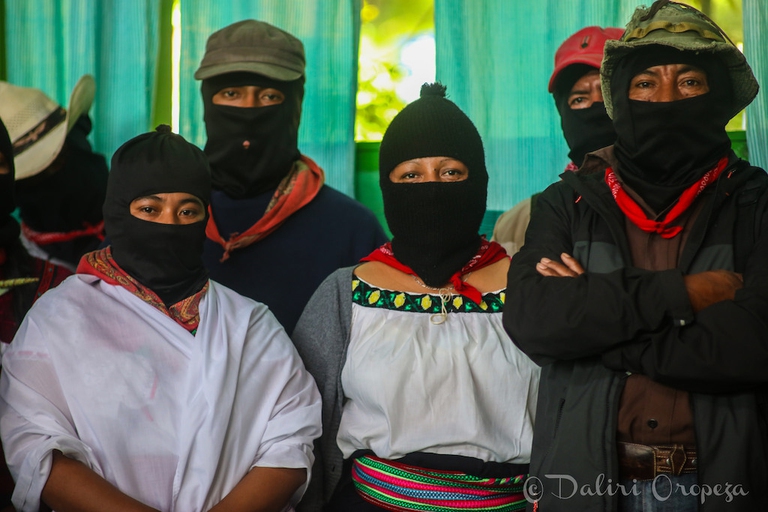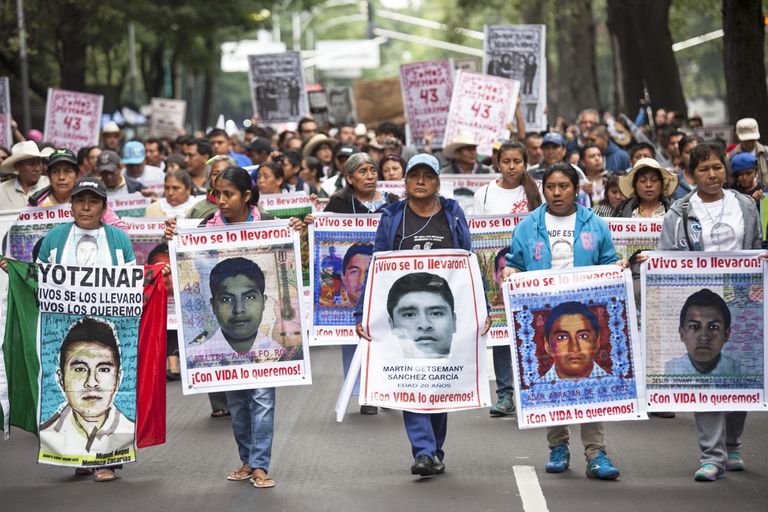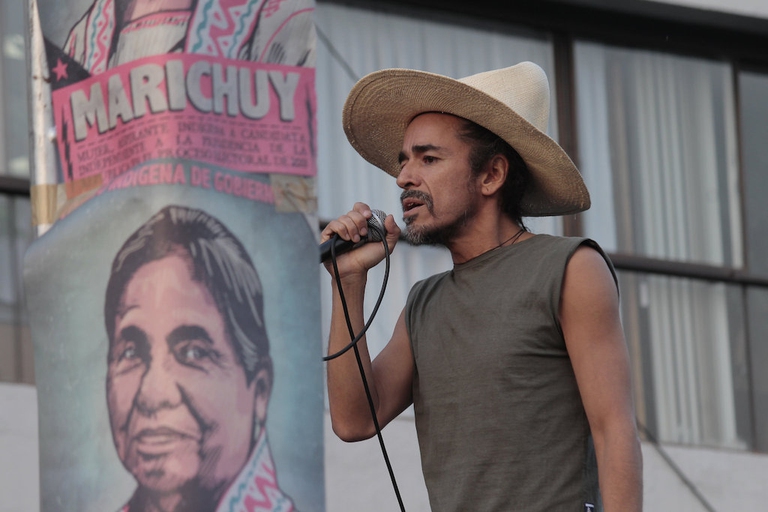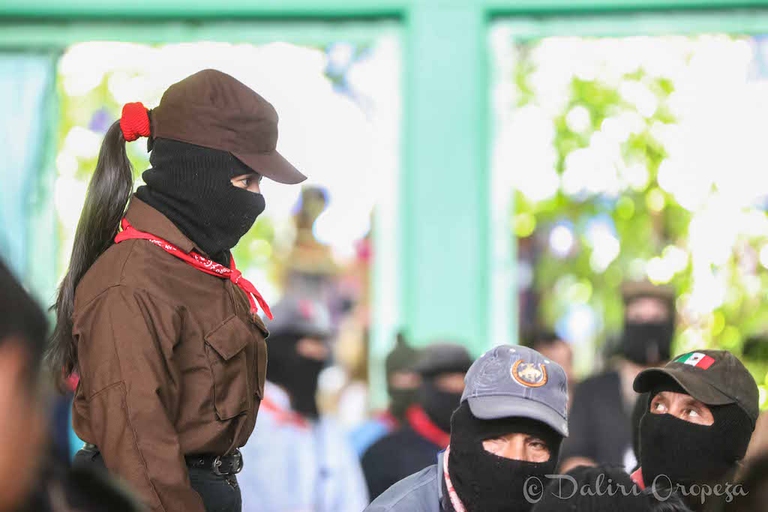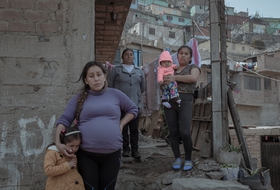
A special report from the Yuqui territory delves deep into the dreams, challenges, joys and sadness of one of Bolivia’s most vulnerable indigenous groups.
Marichuy was chosen to represent Mexican indigenous groups as an independent candidate in the 2018 elections. Though she didn’t make the ballot her campaign shed light on feminism, indigenous rights and the environment.
Marichuy was elected as spokeswoman for the indigenous communities of Mexico, embarking on a campaign to run as an independent candidate in the July 2018 general elections, on the 16th of October 2016. This is the first time independent candidates have been allowed to run for office in the country, on condition of collecting a minimum of over 850,000 signatures. Marichuy’s registration was excluded for not reaching sufficient support for her candidacy by the deadline of the 19th of February this year. However, her campaign has been a success in terms of its impact in promoting the rights of women, indigenous peoples and those of nature.
Born in 1963 in the Nahua community of Tuxpan in Jalisco state, María de Jesús Patricio, known as Marichuy, is an expert in traditional healing, founding the Calli Tecolhuacateca Tochan Clinic in her home town in 1992. In addition, her life has been characterised by incessant political activism. She was a key figure in the Zapatista Army of National Liberation (EZLN), whose armed 1994 uprising sought to unify indigenous communities in Mexico and fight against neoliberal policies such as the North American Free Trade Agreement with the United States and Canada, which came into force that very year threatening the existence of indigenous communities and their native lands.
In 1996, following the EZLN’s armed uprising and subsequent peace agreement with the Mexican government (known as the San Andreas Accords), Marichuy contributed to the creation of the National Indigenous Congress (CNI). This was created by a plurality of indigenous communities and their representatives as a space in which to meet and organise in an independent political arena: promoting alternative forms of organisation, representation and decision-making. Having shunned party politics, the Zapatistas and CNI formed independent autonomous communities known as “Caracoles” across the country. These are founded on the principle of self-determination and have become true models of self-government for people across the globe.
In October 2016 the CNI, together with the EZLN, announced its intention to participate in the national elections by supporting an independent candidate. Marichuy was chosen due to her role as an advocate for the rights of women and indigenous peoples, as well as nature. In fact, the issue of protecting biodiversity is of particular importance to her: as a traditional healer her source of knowledge and medicine are the forests and environment that surround her.
Primer encuentro internacional político, artístico, deportivo y cultural de Las Mujeres que Luchan del 8 al 10 de marzo en el Caracol de Morelia Chiapas. #Rumboalencuentrodemujeres #Mujeresquelucha #CNI #MujeresEZLN pic.twitter.com/yRViR45cJr
— CNI México (@CNI_Mexico) 28 febbraio 2018
This decision comes at a time in which social unrest has mounted in the country on account of the plight of poor and oppressed communities in the country. Issues concerning forced disappearances, conflicts over resource extraction, and women’s and indigenous rights have converged towards finding a voice outside of traditional parties, which include incumbent president Enrique Peña Nieto’s Institutional Revolutionary Party (PRI) and the National Action Party (PAN). Marichuy’s campaign has embraced all these topics and the CNI has contributed to the political traction by forming an Indigenous Government Council which adheres to the Congress’ seven governing principles: serve and not self-serve, construct and not destroy, obey and not order, propose and not impose, convince and not conquer, work from below and don’t seek to climb, represent and not replace. A true contrast to the manifestos of traditional party politics.
Furthermore, the council declared it would carry out its electoral campaign without taking money from the federal budget even if Marichuy had been allowed to run and therefore would have had access to state funds made available to independent candidates, highlighting the importance of the message its members want to get across rather than being focused merely on winning votes. “We’re not going out to ask for votes”, Bettina Cruz, an indigenous Binni Zaa woman from Oaxaca, a council member and vocal environmental activist explained. “The point of getting a candidate on the ballot is to use the attention surrounding the electoral process to organise at a grassroots level across the country”.
866,593 signatures (equivalent to 1 per cent of the voting population) had to be obtained in order to be registered as an independent candidate. Furthermore, these needed to be authenticated through an app that required a mobile device and working internet connection: conditions difficult to meet in rural and poor communities where internet and mobile, especially smartphone, access aren’t guaranteed. This has been denounced as an example of inequality of access to the democratic process itself.
Some claim that these regulations were deliberately adopted to ensure that only professional politicians with access to significant funds could make the ballot. In other words, the new policy of accepting independent candidates is seen not so much as a route for outsider forces to access the political sphere but rather as a plan B for “the same old faces” who weren’t nominated by their respective parties to re-enter it. In fact, among those who succeed in registering are Jaime Rodriguez and Margarita Zavala, two veterans of mainstream party politics.
“These elections aren’t for the poor of this country, but rather for the rich, demanding (that we use) technologies for the collection of signatures that in many of our communities we don’t even have.” (Marichuy)
Marichuy was officially excluded from the list of independent candidates on the 19th of February, obtaining only around a quarter of the necessary signatures. Notwithstanding the defeat, the campaign led by Marichuy has been perceived as a moment of great historic importance. Not only because it has shed light on the barriers to entry for new political actors but also in raising awareness on a plurality of issues related to being an indigenous citizen and a woman in Mexico, as well protecting the environment.
“We, the indigenous people, say we don’t agree with this system – to be exploited, to have them continue to destroy our communities. It should be the people who give the orders and the government that obeys.” (Marichuy)
Marichuy’s focus on the destructive forces of globalised capitalism, the link between environmental protection and social justice, and the idea that women and indigenous people must be listened to as they have important contributions to make to our planet’s future, is to be considered a great victory. By visiting remote communities, talking to their inhabitants and listening to what they have to say, Marichuy hasn’t only fulfilled the goal of assisting citizens in organising and achieving self-determination, she has also brought the world’s attention to the themes of racism, sexism and the plight of nature in Mexico and beyond.
Siamo anche su WhatsApp. Segui il canale ufficiale LifeGate per restare aggiornata, aggiornato sulle ultime notizie e sulle nostre attività.
![]()
Quest'opera è distribuita con Licenza Creative Commons Attribuzione - Non commerciale - Non opere derivate 4.0 Internazionale.
A special report from the Yuqui territory delves deep into the dreams, challenges, joys and sadness of one of Bolivia’s most vulnerable indigenous groups.
One in three women have suffered physical or sexual violence. With contributions from Europe, Africa, Asia and Latin America, we look at how this shadow pandemic affects every corner of the world.
The Istanbul Convention against gender-based and domestic violence marks its tenth anniversary. We look at what it is, who its signatories are, and what the future might hold.
European Commission President Ursula von der Leyen reminded us of the gravity of violence against women around the world, and of the Istanbul Convention’s utmost importance.
The Yuqui people of the Bolivian Amazon fight not only to survive in the face of settlers, logging and Covid-19, but to preserve their culture and identity.
President Erdoğan has pulled Turkey out of the Istanbul Convention, key in the fight against gender violence, claiming that it favours the LGBT community rather than family values.
Jair Bolsonaro is accused of crimes against humanity for persecuting indigenous Brazilians and destroying the Amazon. We speak to William Bourdon and Charly Salkazanov, the lawyers bringing the case before the ICC.
Activists hail the decision not to hold the 2023 World Anthropology Congress at a controversial Indian school for tribal children as originally planned.
Violence against women in Peru has increased as a result of Covid-19 lockdowns. 14,912 people were reported missing from January to November 2020, more than half of them minors and 64 per cent women. People have been confined to their homes for months, many forced to endure poor physical, economic and social conditions. A situation that
